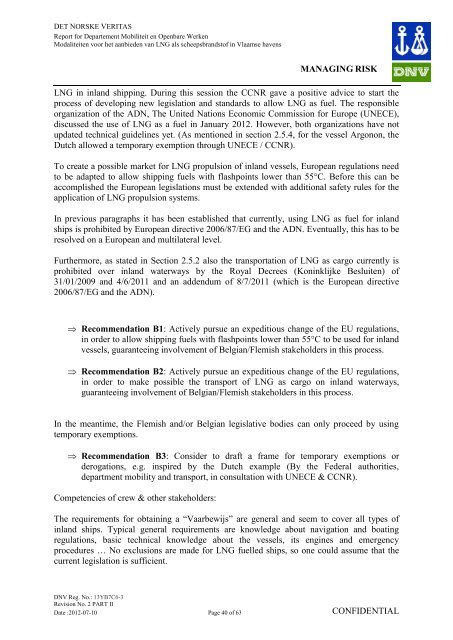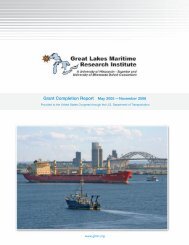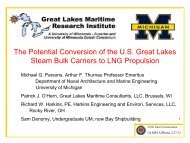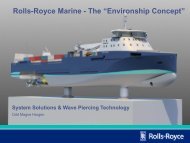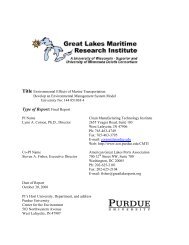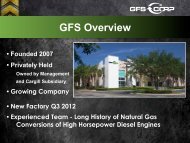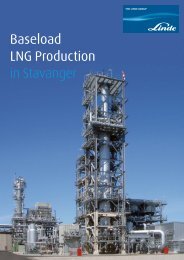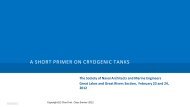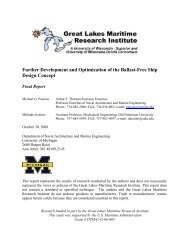Modalities for the provisioning of LNG as shipping fuel in Flemish Ports
Modalities for the provisioning of LNG as shipping fuel in Flemish Ports
Modalities for the provisioning of LNG as shipping fuel in Flemish Ports
You also want an ePaper? Increase the reach of your titles
YUMPU automatically turns print PDFs into web optimized ePapers that Google loves.
DET NORSKE VERITAS<br />
Report <strong>for</strong> Departement Mobiliteit en Openbare Werken<br />
Modaliteiten voor het aanbieden van <strong>LNG</strong> als scheepsbrandst<strong>of</strong> <strong>in</strong> Vlaamse havens<br />
MANAGING RISK<br />
<strong>LNG</strong> <strong>in</strong> <strong>in</strong>land <strong>shipp<strong>in</strong>g</strong>. Dur<strong>in</strong>g this session <strong>the</strong> CCNR gave a positive advice to start <strong>the</strong><br />
process <strong>of</strong> develop<strong>in</strong>g new legislation and standards to allow <strong>LNG</strong> <strong>as</strong> <strong>fuel</strong>. The responsible<br />
organization <strong>of</strong> <strong>the</strong> ADN, The United Nations Economic Commission <strong>for</strong> Europe (UNECE),<br />
discussed <strong>the</strong> use <strong>of</strong> <strong>LNG</strong> <strong>as</strong> a <strong>fuel</strong> <strong>in</strong> January 2012. However, both organizations have not<br />
updated technical guidel<strong>in</strong>es yet. (As mentioned <strong>in</strong> section 2.5.4, <strong>for</strong> <strong>the</strong> vessel Argonon, <strong>the</strong><br />
Dutch allowed a temporary exemption through UNECE / CCNR).<br />
To create a possible market <strong>for</strong> <strong>LNG</strong> propulsion <strong>of</strong> <strong>in</strong>land vessels, European regulations need<br />
to be adapted to allow <strong>shipp<strong>in</strong>g</strong> <strong>fuel</strong>s with fl<strong>as</strong>hpo<strong>in</strong>ts lower than 55°C. Be<strong>for</strong>e this can be<br />
accomplished <strong>the</strong> European legislations must be extended with additional safety rules <strong>for</strong> <strong>the</strong><br />
application <strong>of</strong> <strong>LNG</strong> propulsion systems.<br />
In previous paragraphs it h<strong>as</strong> been established that currently, us<strong>in</strong>g <strong>LNG</strong> <strong>as</strong> <strong>fuel</strong> <strong>for</strong> <strong>in</strong>land<br />
ships is prohibited by European directive 2006/87/EG and <strong>the</strong> ADN. Eventually, this h<strong>as</strong> to be<br />
resolved on a European and multilateral level.<br />
Fur<strong>the</strong>rmore, <strong>as</strong> stated <strong>in</strong> Section 2.5.2 also <strong>the</strong> transportation <strong>of</strong> <strong>LNG</strong> <strong>as</strong> cargo currently is<br />
prohibited over <strong>in</strong>land waterways by <strong>the</strong> Royal Decrees (Kon<strong>in</strong>klijke Besluiten) <strong>of</strong><br />
31/01/2009 and 4/6/2011 and an addendum <strong>of</strong> 8/7/2011 (which is <strong>the</strong> European directive<br />
2006/87/EG and <strong>the</strong> ADN).<br />
Recommendation B1: Actively pursue an expeditious change <strong>of</strong> <strong>the</strong> EU regulations,<br />
<strong>in</strong> order to allow <strong>shipp<strong>in</strong>g</strong> <strong>fuel</strong>s with fl<strong>as</strong>hpo<strong>in</strong>ts lower than 55°C to be used <strong>for</strong> <strong>in</strong>land<br />
vessels, guarantee<strong>in</strong>g <strong>in</strong>volvement <strong>of</strong> Belgian/<strong>Flemish</strong> stakeholders <strong>in</strong> this process.<br />
Recommendation B2: Actively pursue an expeditious change <strong>of</strong> <strong>the</strong> EU regulations,<br />
<strong>in</strong> order to make possible <strong>the</strong> transport <strong>of</strong> <strong>LNG</strong> <strong>as</strong> cargo on <strong>in</strong>land waterways,<br />
guarantee<strong>in</strong>g <strong>in</strong>volvement <strong>of</strong> Belgian/<strong>Flemish</strong> stakeholders <strong>in</strong> this process.<br />
In <strong>the</strong> meantime, <strong>the</strong> <strong>Flemish</strong> and/or Belgian legislative bodies can only proceed by us<strong>in</strong>g<br />
temporary exemptions.<br />
Recommendation B3: Consider to draft a frame <strong>for</strong> temporary exemptions or<br />
derogations, e.g. <strong>in</strong>spired by <strong>the</strong> Dutch example (By <strong>the</strong> Federal authorities,<br />
department mobility and transport, <strong>in</strong> consultation with UNECE & CCNR).<br />
Competencies <strong>of</strong> crew & o<strong>the</strong>r stakeholders:<br />
The requirements <strong>for</strong> obta<strong>in</strong><strong>in</strong>g a “Vaarbewijs” are general and seem to cover all types <strong>of</strong><br />
<strong>in</strong>land ships. Typical general requirements are knowledge about navigation and boat<strong>in</strong>g<br />
regulations, b<strong>as</strong>ic technical knowledge about <strong>the</strong> vessels, its eng<strong>in</strong>es and emergency<br />
procedures … No exclusions are made <strong>for</strong> <strong>LNG</strong> <strong>fuel</strong>led ships, so one could <strong>as</strong>sume that <strong>the</strong><br />
current legislation is sufficient.<br />
DNV Reg. No.: 13YB7C6-3<br />
Revision No. 2 PART II<br />
Date :2012-07-10 Page 40 <strong>of</strong> 63 CONFIDENTIAL


